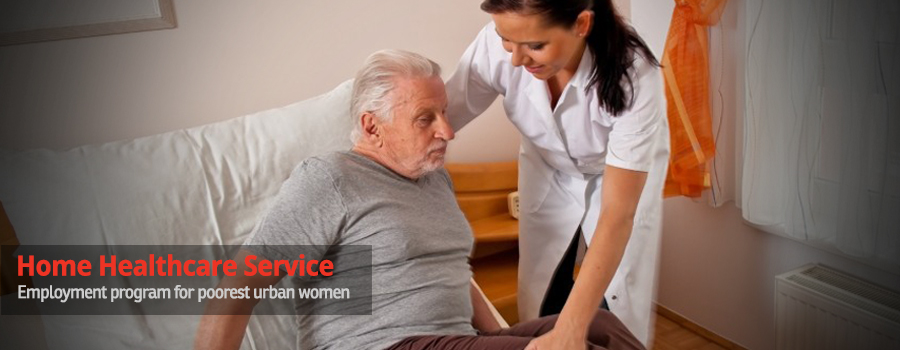OVERVIEW – Employment program for poorest urban women
As a result of advances in medical sciences and increased access to health care services, people are living much longer, and consequently the demography of Bangladesh is shifting towards an aging population. The population above the age of 60, presently constituting 7% of the total population of Bangladesh, is projected to be 10% by 2025 and 15% by 2050. Along with an aging population, Non-communicable diseases have emerged as the biggest burden of disease for this century. Therefore, it is imperative to create policies and domiciliary services that ensure proper management of NCD’s for the elderly in order to maintain equitable and just society.
Delivering care to the sick and the elderly in the comfort of home is a necessary aspect of healthcare service delivery. Since the turn of the century, the concept and practice of family doctors making house calls has declined. In addition, the acute shortage of both Nurses and Nurses Aid has made it difficult to deliver geriatric care to the elderly at home. Since the elderly urban population prefers to reside at home with their families, changes in the urban family lifestyle have made caring for the elderly or disabled a challenge with regard to time, safety, privacy, dignity, comfort, and cost.
ACTIVITY – Home Healthcare Service (HHS)
Good HEAL Trust aims to implement Home Healthcare Service (HHS),an urbanhome-based, non-medical assistance to the elderly, in order to enhance employment opportunities of the poor women and girls of Korail Slum by enabling them to contribute as an integral part of society.
Good HEAL Trust is partnering with Diabetic Association of Bangladesh (DAB), the largest health service provider after GoB, to train and certify HHS providers throughthe Bedside Assistant Training Program (BATP) designed using the model of a non-technical, semi-skilled community caregiverwho will also be able to serve in a hospital, clinic, or nursing home.As of April 2013, 8 women from the slum completed training and have received Certificate.
HHS services at-a-glance:
- Feeding, toileting, bathing, dressing, and grooming patients;
- Help prevent bedsore;
- Assist with medication and exercise;
- Measure temperature, heart rate, blood pressure, and blood glucose;
- Administer intravenous saline and insulin;
- Collect blood, urine, and stool samples for laboratory work;
- Arrange Doctors or Physical Therapists visit at Patient’s home;
- Arrange ECG, Chest x-ray, and Ultrasound at Patient’s home;
- Arrange Emergency Ambulance service for Patient to any Hospital within Bangladesh;
- Companionship.

